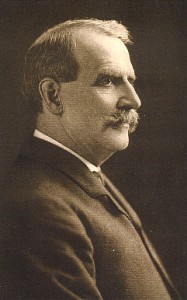 On the seventh ballot of their meeting yesterday, the members of the Republican National Committee elected Wisconsin state party chairman Reince Priebus as their new chairman. Contrary to some reports, Priebus is not the first national party chairman from Wisconsin. That designation belongs to Henry Clay Payne, who chaired the RNC for a brief time in 1904.
On the seventh ballot of their meeting yesterday, the members of the Republican National Committee elected Wisconsin state party chairman Reince Priebus as their new chairman. Contrary to some reports, Priebus is not the first national party chairman from Wisconsin. That designation belongs to Henry Clay Payne, who chaired the RNC for a brief time in 1904.
Payne started his political career in 1872 at the most grassroots level – the Young Men’s Republican Club of Milwaukee County – as a volunteer for President Grant’s reelection campaign. As a reward for his party service, he was appointed postmaster of Milwaukee in 1876 – this before civil service laws protected such positions from political patronage. At one point, he told the citizens of Milwaukee, “As long as I am postmaster, I shall employ only Republicans if I can find those that are competent.” When Democrat Grover Cleveland won the presidency in 1884, he promptly fired Payne as postmaster, labeling him an “offensive partisan.”
Between administrations, he served as an executive for various prominent Milwaukee companies. During that time, he served as a member of the Republican National Committee from Wisconsin. When he was recruited for RNC chairman in 1896, he passed on the opportunity because his company had just been through a significant labor dispute that would have been a source of controversy. Though without the title chairman, he was the moving force behind the committee in that cycle, managing things from the Chicago headquarters. Joseph Babcock, chairman of the National Republican Congressional Committee and representative of Wisconsin’s third district, said of Payne’s work, “I was never able to broach a subject that he was not thoroughly posted on and he seemed to have as clear ideas as to matters coming under the jurisdiction of the Congressional Committee as he had of matters pertaining to his own committee.”
In 1900, following the successful presidential campaign of William McKinley, Payne took over as vice chairman of the RNC, where he led an effort to reapportion convention delegates based on Republican vote totals rather than congressional districts. Two years later, President Theodore Roosevelt appointed him Postmaster General, at the time a cabinet-level post, though he remained RNC vice chairman.
In February of 1904, the legendary Mark Hanna, then a U.S. senator from Ohio and chairman of the RNC, passed away unexpectedly. Under the rules, Payne as vice chair ascended to the chairmanship, a position he held until June of 1904, when a National Convention was held in Chicago and a new chairman elected. Sickly during those summer months, he passed away shortly thereafter, on October 4, 1904. His remains were returned to Milwaukee, and he is buried in Forest Home Cemetery.
He was eulogized by many friends from both sides of the aisle, in Wisconsin and across the nation. Many of these salutes are collected in a hagiographical volume composed for his widow and available in full on Google Books. I will close by selecting just one of the many praises offered, this from U.S. Senator John Spooner of Wisconsin at the closer of his tenure as Milwaukee’s postmaster: “Payne is a born leader of men, possessed of superb ability as an organizer of tireless energy, unwavering in his devotion to the principles of his party, unselfish and self-sacrificing in the personal services he yields to the cause in which he believes. He deserves the gratitude of every Republican, as he has won the respect of every Democrat who likes a fair fight, and admires an opponent who deals hard blows, and takes them in return like a man.”
As Reince Preibus begins his tenure as chairman of the Republican National Committee, I look forward to seeing another Wisconsin man lead the party with energy, ability, and devotion.

Dan
Thanks for calling Henry C. Payne to our attention. He was a very important political figure in Wisconsin in the 19th century, and it is sad that he has been largely forgotten, even by Wisconsin historians.
Not that it matters, but as far as I can tell, the Methodist Payne had no connection whatsover to Marquette University. Marquette is not even mentioned in the biography that the family commissioned shortly after his death in 1904.
However, he was a close friend, though political opponent, of James G. Jenkins, the law school’s first dean. They were among the early supporters of the YMCA in Milwaukee, and they knew each other for almost 40 years. Jenkins was a pall bearer at Payne’s funeral (as was Joseph V. Quarles and Gustav Pabst), and he wrote a moving memorial to him after his death which the biographer, William Wright, used to conclude his volume.
Of course, Jenkins himself did not become directly affiliated with Marquette until the fall of 1908, four years after Payne’s death.